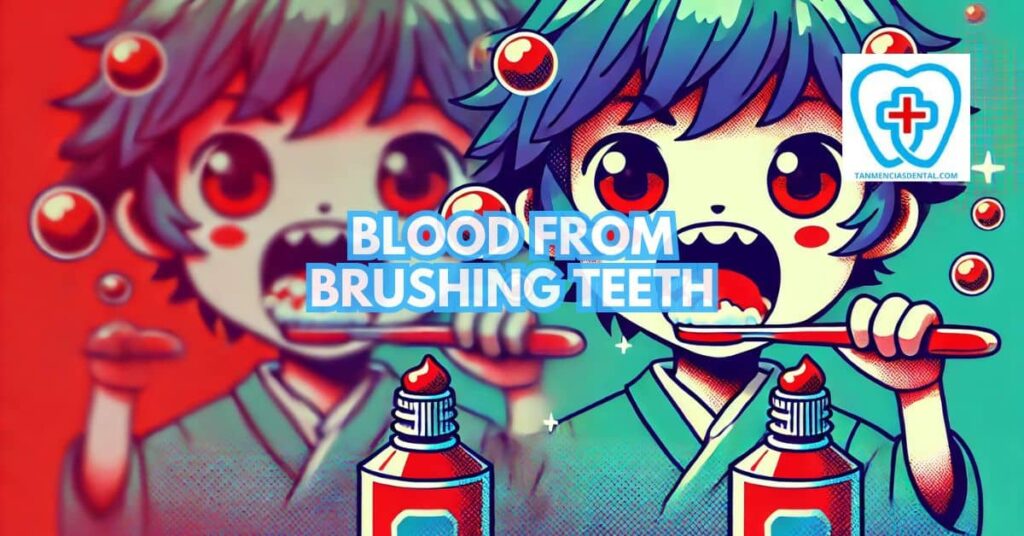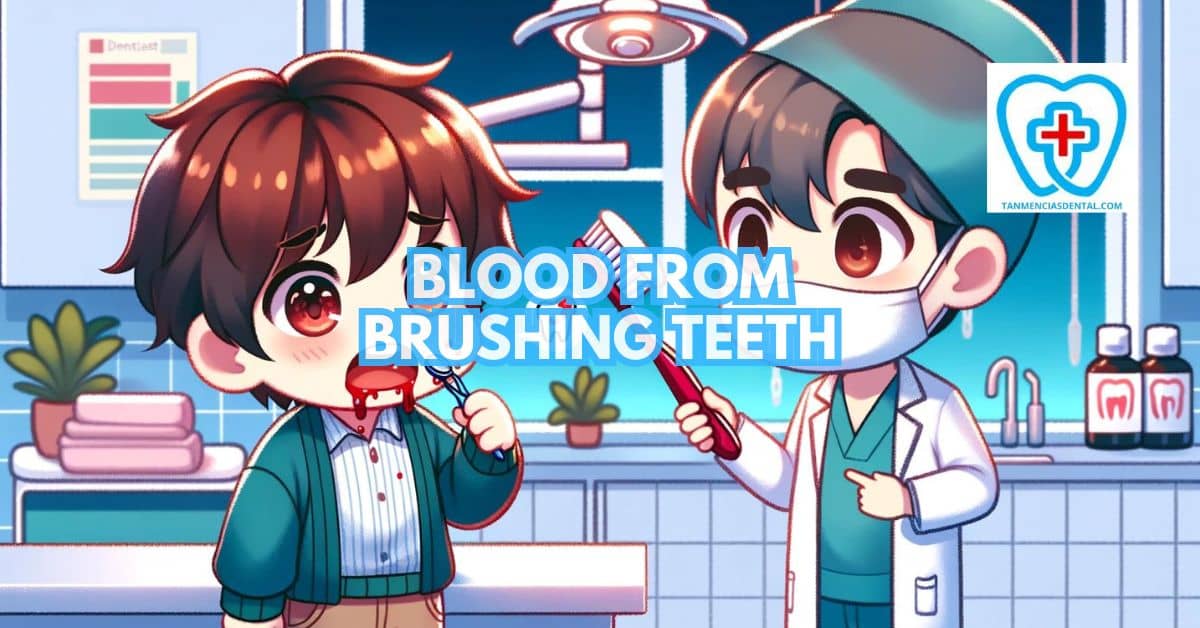Noticing blood from brushing teeth can be surprising and worrisome.
We’ll explain the many reasons why your gums might bleed.
It looks at causes like brushing too hard, gum infections, and missing vitamins.
We also advise on when to see a dentist and how to improve your daily care.
By learning more about your gums, you can work to keep them and your whole body healthy.
1. Is Little Blood Normal After Brushing?
A little blood after brushing can sometimes be normal, especially if you accidentally brush too hard or have a small gum injury.
However, if you frequently experience bleeding, it may be a sign of an underlying issue, such as gum disease or inflammation.
Brushing too aggressively can irritate the gums and lead to bleeding, making it important to use a soft-bristled toothbrush and gentle strokes.
Poor oral hygiene can also contribute to gum problems, so maintaining a good oral care routine with regular flossing and brushing is essential.
If you notice bleeding often, switching to a toothbrush with softer bristles and improving your flossing habits may help reduce irritation.
In some cases, vitamin deficiencies or certain medical conditions can also cause gums to bleed more easily.
If the bleeding persists despite good oral care, it’s best to consult a dentist to rule out any serious concerns.
🦷 Is it Possible to Feel Your Teeth Moving While Wearing Braces?
2. Gingivitis: The Gum Disease Causing the Blood
Gingivitis is a common cause of bleeding gums and is considered an early stage of gum disease.
It happens when plaque builds up along the gumline, leading to inflamed gums that become red, tender, and prone to bleeding.
One of the first signs of gum disease is swollen gums that may feel sore and bleed when brushing or flossing.
If left untreated, gingivitis can progress into periodontal disease, a more severe condition that affects the gums and bone supporting the teeth.
The main cause of bleeding gums in gingivitis is the irritation from bacteria in plaque, which triggers an immune response that weakens gum health.
Regular brushing, flossing, and professional cleanings help remove plaque and reduce the risk of gum disease.
Early treatment is crucial because advanced gum disease can lead to tooth loss and other serious oral health problems.
🦷 How to Improve Your Technique for Brushing Your Teeth
3. Brushing Too Hard? You Might Be Hurting Your Gums!
Using too much force while brushing can harm your gums.
A soft-bristled toothbrush and gentle strokes are recommended.
Aggressive brushing can lead to gum recession and sensitivity.
It’s important to use the correct technique to protect your gums.
If you’re unsure about your brushing method, your dentist can provide guidance.
🦷 Why Can Teeth with Fillings Be Whitened, but Not in the Same Manner as Natural Teeth?
4. Beyond Brushing: Other Reasons Your Gums Might Bleed
Bleeding gums can result from factors beyond brushing habits.
Hormonal changes, especially during pregnancy, can make gums more sensitive.
Certain medications, like blood thinners, may also contribute to gum bleeding.
Additionally, health conditions such as diabetes can affect gum health.
It’s essential to consider these factors and discuss them with your dentist.
🦷 Is it Possible to Have Wisdom Teeth Removed While Wearing Braces?

5. More Than Just Blood: Signs You Need to See a Dentist
Bleeding gums are often accompanied by other symptoms.
Red, swollen, or tender gums can indicate a more serious problem.
Persistent bad breath or a bad taste in the mouth might also be a sign.
If you experience loose teeth or pain while chewing, it’s crucial to seek dental advice.
These signs point to potential oral health issues that require professional attention.
🦷 Essential Information You Should Know About Dental Implants Before and After Surgery
6. Why Visit the Dentist? Unveiling the Mystery Behind the Bleeding
A dentist can diagnose the root cause of your bleeding gums.
They have the expertise and tools to identify issues that aren’t visible to the naked eye.
Regular dental visits allow for early detection and treatment of gum disease.
Addressing the problem early can prevent it from worsening.
Professional care is essential for maintaining long-term oral health.
🦷 Is It Possible to Get Veneers Without Reshaping Your Teeth?
7. Brushing and Flossing Done Right: Techniques for Healthy Gums
Proper brushing and flossing are crucial for healthy gums.
Brush for two minutes, twice a day, using fluoride toothpaste.
Make sure to reach all areas of your mouth, including the back teeth.
Flossing daily helps remove plaque and food particles between teeth.
These practices reduce the risk of gum disease and keep your gums healthy.
🦷 Mini Dental Implants Versus Traditional Dental Implants: A Comprehensive Comparison for Your Smile
8. Regular Checkups: The Key to Preventing Gum Disease
Regular dental checkups are essential for preventing gum disease because they help remove plaque and tartar that build up along the gum line.
If plaque is not cleaned properly, it can harden into tartar, which increases the risk of gingivitis, a common form of gum disease.
Over time, untreated gum disease can lead to receding gums, making teeth appear longer and exposing their roots to damage.
A dentist can spot early signs of gum problems, such as swelling, redness, or bleeding, and recommend treatment before the condition worsens.
Professional cleanings and exams help prevent infections that could weaken the gums and cause tooth loss.
Good oral hygiene at home, combined with regular dental visits, significantly reduces the risk of developing gum disease.
Scheduling checkups at least twice a year is a simple way to keep your gums and teeth healthy for life.
🦷 How Teeth Whitening May Impact Your Gums and Steps You Can Take to Prevent Damage
9. Building Strong Gums: Lifestyle Habits for a Healthy Smile
Healthy lifestyle habits contribute significantly to strong gums.
Eating a balanced diet rich in vitamins and minerals supports gum health.
Avoiding tobacco products helps prevent gum disease and oral cancer.
Managing stress can also positively impact your oral health, as stress can weaken your immune system.
Incorporating these habits into your daily routine promotes a healthy smile.
🦷 Can Retainers Be Used to Straighten Teeth Without the Need for Braces?
10. Nutrition and Gum Health
A balanced diet plays a key role in keeping your gums strong.
Not getting enough vitamins, like vitamin C, can make your gums weak.
Weak gums may start to bleed easily when you brush your teeth.
Eating fruits, vegetables, and whole foods helps protect your gums.
Good nutrition supports overall oral health and can reduce gum problems.
11. Don’t Ignore the Blood: Taking Action for Healthy Gums
If you notice blood while brushing, it’s important not to ignore it.
Start by evaluating and improving your oral hygiene practices.
Use a soft-bristled toothbrush and proper brushing techniques.
Schedule a visit to your dentist to identify and address any underlying issues.
Taking timely action can prevent serious oral health problems and ensure your gums remain healthy.
🦷 Tan-Mencias Dental Office, Marikina City
👨⚕️ Conclusion
Your gum health is crucial to your overall well-being.
Bleeding gums can be a sign of underlying issues that need attention.
Regular dental visits, proper oral hygiene, and healthy lifestyle habits are key to maintaining healthy gums.
Don’t wait to address any problems; see your dentist to ensure your gums and teeth stay in optimal condition.
Prioritizing your gum health is an investment in your long-term health.
😊 Self-Promotion
Visit Tan-Mencias Dental Clinic in Parang, Marikina City, where your smile is our priority!
Our friendly and professional team is ready to provide top-notch dental care to keep your teeth and gums healthy.
Have questions or need to schedule an appointment?
Give us a call at 9171451074, message us on Facebook, or use the contact form on our website.
We’re here to help, and we look forward to seeing you soon!

